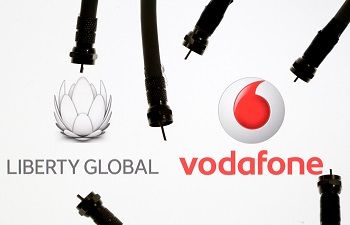Vodafone raised US$2bn from a rare US-dollar hybrid bond on Thursday, the final part of the financing for the UK-based telecom company’s US$21.8bn acquisition of Liberty Global’s assets.
The hybrid was always part of its funding plan, according to analysts at CreditSights, and follows quickly after a €4bn-equivalent mandatory convertible bond (MCB) sale that also helped finance the Liberty deal.
Vodafone had been seeking equity credit from the convertible in order to help support its Baa2/BBB+/BBB+ ratings. But those plans hit a snag after S&P and Moody’s in the past week said they would not give the securities any equity credit at all.
Fitch gave the mandatory convertible 50% equity credit.
“Without the equity credit, their debt leverage is higher. The agencies could take a harder line with them, that could lead to a downgrade,” said David Shnaps, senior European technology, media and telecom analyst at CreditSights.
“Given that they are already on a negative outlook at Moody’s I wouldn’t be surprised if this pushes them into the (low BBB) territory.”
Mandatory convertible bonds typically fetch 100% equity credit from the rating agencies. Vodafone had been seeking just 50%, one banker told IFR.
Moody’s and S&P, however, said they viewed the convertibles as 100% debt partly because Vodafone plans to buy back the shares when they convert, which would be financed with more hybrids.
Still, CreditSights expects downward pressure on Vodafone’s spreads to be limited.
“The company has made it clear to us that they do not want to be BBB-/Baa3,” said CreditSights. “They point to a number of levers that they can and are pulling in order to relieve pressure.”
STRONG DEMAND
Its ratings didn’t seem to put off investors either.
Books on the 60 non-call 10 year hybrid reached US$9bn at guidance stage. That allowed Vodafone to lower the yield to 7.125% from initial price thoughts of 7.5%, one of the leads said.
The yield was then lowered again, settling at 7%, which prompted some on the buyside to back out of the deal. Final books were heard to be US$6.5bn, one of the leads on the deal said.
It still offering a roughly 270bp pickup over Vodafone’s senior bonds even at that final yield, according to CreditSights estimates.
After Thursday’s hybrid sale, Vodafone in total will have raised €6bn in hybrids (€3bn of which is counted as equity credit) and €4bn in mandatory convertible bonds (all of which is counted as equity credit by Vodafone, if not by the credit rating agencies) to fund the acquisition, according to CreditSights.
That’s on top of the US$11.3bn (€10bn equivalent) dollar bond it issued in May 2018, just after Vodafone agreed to buy Liberty Global’s assets in Germany and eastern Europe.
Moody’s and S&P expect Vodafone’s leverage to rise to between 3.4 to 3.8 times over the next two years as a result of the total financing and assuming no equity credit for the convertibles.
“The market is still pretty healthy and there are plenty of people still willing to buy this debt,” Dave Novosel, an analyst at Gimme Credit, told IFR.
“Vodafone is not by any means what I would consider a troubled credit. They are not as strong as they used to be from a credit perspective and they will be even weaker with this new debt, but they aren’t [a threat of becoming] a high yield name.”
Bank of America Merrill Lynch and RBC Capital Markets are joint global coordinators, with joint bookrunners BNP Paribas, HSBC and Standard Chartered.
